PRINCETON, NJ -- Democratic House Speaker Nancy Pelosi and former Vice President Dick Cheney have little in common politically, but they receive almost identical image ratings from the American public. According to a May 29-31 Gallup Poll, 37% of Americans have a favorable view of Cheney and 34% have a favorable view of Pelosi. Both Cheney and Pelosi are viewed unfavorably by at least half of Americans.
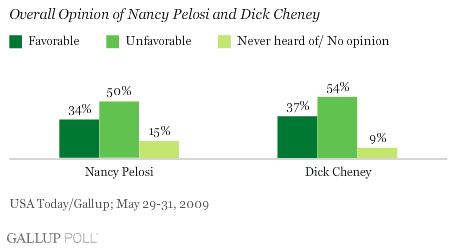
The similarity between Cheney's and Pelosi's ratings is notable given that the two have emerged as the leading voices on either side of this year's debate over whether the government's use of "enhanced interrogation techniques" against terrorist suspects constitutes torture.
Cheney came out of his brief vice presidential retirement in March to publicly defend the Bush administration's support of CIA interrogation policies, and on May 21 went head-to-head with President Barack Obama on the issue in separate national security speeches. Pelosi has condemned "waterboarding" and earlier this year supported a call to investigate Bush administration officials who authorized it; however, she recently fell into a public battle with the CIA over whether she was previously briefed on the agency's use of the coercive technique.
Trends
Pelosi's current image rating is more negative than positive by a 16 percentage point margin: 34% favorable and 50% unfavorable. Six months ago about equal percentages held favorable and unfavorable views of her.
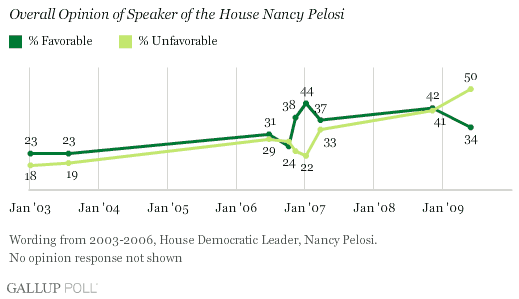
While still negative, Cheney's image today (with 37% viewing him favorably and 54% unfavorably) is improved compared with his ratings in March of this year. At that time, only 30% viewed him favorably and 63% unfavorably, his worst ratings on balance since he was nominated as George W. Bush's vice presidential candidate in July 2000 (although his ratings were nearly as bad when previously measured in 2007).
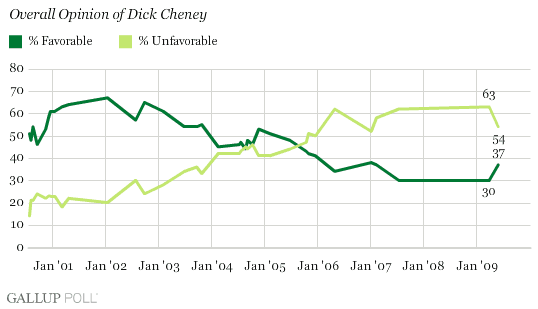
Cheney's improved ratings are mainly due to the views of independents: the percentage viewing him favorably rose from 21% in March to 37% today. There was also a slight increase in his favorable rating from Republicans, from 64% to 70%.
Pelosi's decline since last fall is seen equally in her ratings from Republicans and independents, with little change in the views of Democrats. The percentage of Republicans viewing her favorably fell 12 points, from 21% to 9%; the same drop in favorability was seen among independents, from 37% to 25%. Sixty-two percent of Democrats now view her favorably, down just slightly from 66% in November.
A Polarizing Pair
As a result of the changes, both Cheney and Pelosi are now positioned as highly polarizing figures on the political landscape; both are viewed favorably by the large majority of their own party members, and unfavorably by most members of the opposing party.
To the extent either one influences voters' views about the two major political parties, particularly looking ahead to the 2010 midterm elections, Cheney may be less problematic for his party than Pelosi might be for hers. He currently has a slight edge in intra-party popularity: 70% of Republicans view him favorably compared with 62% of Democrats viewing Pelosi favorably. Also, more independents view Cheney favorably than view Pelosi favorably: 37% vs. 25%.
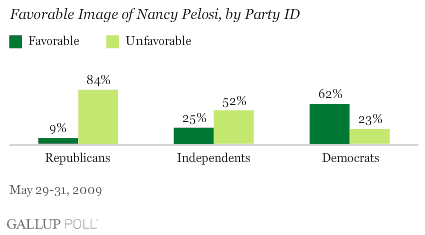
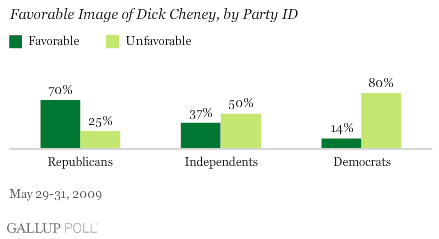
Bottom Line
After President Obama, Pelosi and Cheney are arguably the next most prominent political figures active in the two major parties today. Both have attracted significant news coverage in the mainstream press this year, most recently for their positions on the government's interrogation policies for suspected terrorists.
That coverage appears to have helped Cheney -- at least modestly -- in the image department. Given Americans' concern about closing Guantanamo Bay, his improved ratings since March are arguably related to his ongoing outspokenness on waterboarding, tying it in with U.S. national security.
Pelosi has had a major, high profile role in the legislative agenda of Congress all year, most notably with passage of Obama's economic stimulus package in January; however the recent controversy over her possible knowledge of waterboarding -- and her claim that the CIA misled Congress about briefing her -- may have more to do with her depressed favorable ratings, which are down eight points since November.
Survey Methods
Results are based on telephone interviews with 1,015 national adults, aged 18 and older, conducted May 29-31, 2009. For results based on the total sample of national adults, one can say with 95% confidence that the maximum margin of sampling error is ±3 percentage points.
Interviews are conducted with respondents on land-line telephones (for respondents with a land-line telephone) and cellular phones (for respondents who are cell-phone only).
In addition to sampling error, question wording and practical difficulties in conducting surveys can introduce error or bias into the findings of public opinion polls.
